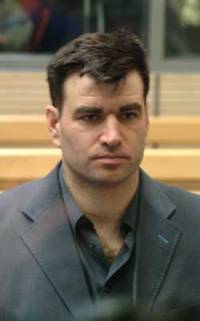Milosevic's paramilitary commander and 11 other men convicted of Zoran Djindjic assassinating
Slobodan Milosevic's paramilitary commander and 11 other men were convicted of assassinating Serbia's first democratically elected prime minister, Zoran Djindjic.

The Special Court said Milorad Ulemek former head of Milosevic's elite Red Berets paramilitary unit set up during the wars in Bosnia and Croatia in the 1990s organized the March 12, 2003, sniper attack in front of Serbian government headquarters.
Red Berets' deputy commander Zvezdan Jovanovic was convicted of pulling the trigger. Both Ulemek and Jovanovic were sentenced to 40 years in prison the maximum under Serbian law. The other 10 men received sentences between eight and 35 years.
The verdict, read out by chief judge Nata Mesarovic, said the 12 had conspired to kill Djindjic to halt his pro-Western reforms, bring Milosevic's allies back to power and stop further extradition of war crimes suspects to the U.N. war crimes tribunal in The Hague, Netherlands.
"It was not an ordinary murder, it was a political murder with an aim to destabilize the state," Mesarovic said. Ulemek and the others showed no emotion.
Serbia's pro-Western President Boris Tadic and several members of Djindjic's former Cabinet attended the court session. Most of them expressed satisfaction with the verdicts, but claimed that the trial dubbed here as "Serbia's trial of the century" failed to address the political motive of the killing.
"The unveiling of the political motive was impossible because Serbia is now under the rule of Vojislav Kostunica," the current conservative prime minister who succeeded Djindjic, said Cedomir Jovanovic, deputy premier under Djindjic. "We will not stop until we hear in court who profited from Djindjic's death."
Djindjic, Serbia's first democratically elected premier since World War II, spearheaded Milosevic's removal from power in 2000. He later handed Milosevic over to the U.N. tribunal to answer for his role in the 1990s wars during the breakup of Yugoslavia. Milosevic died of a heart attack in his prison cell last year.
Milosevic used the Red Berets as a crack unit that spread fear and atrocities against non-Serbs during the Balkan wars in the 1990s. They were later accused of murder and violence against his political opponents in Serbia.
Ulemek, known by his nom de guerre Legija for serving in the French foreign legion, had been sentenced already to 40 years in a separate trial for his part in the May 2000 killing of former Serbian President Ivan Stambolic one of Milosevic's political foes. He received another 15-year sentence for organizing the 1999 attack on Vuk Draskovic an opposition leader at the time and until recently Serbia's foreign minister.
The landmark trial of the 12, Serbia's first for organized crime, started in December 2003. It has been delayed by bureaucratic and legal wrangling, the murder of two prosecution witnesses, the resignation of a chief judge only months before the trial was to end and apparent attempts by Djindjic's political successors to influence the trial proceedings.
All but one of the suspects denied during the trial that they organized and carried out the assassination. Five of the 12 suspects were at large, having disappeared after the killing, and were tried in absentia.
Lawyers for Ulemek and Jovanovic said they would appeal the verdict.
"Instead of being the temple of justice, the Special Court has become a crematorium of law," said Jovanovic's lawyer Nenad Vukasovic.
Subscribe to Pravda.Ru Telegram channel, Facebook, RSS!


